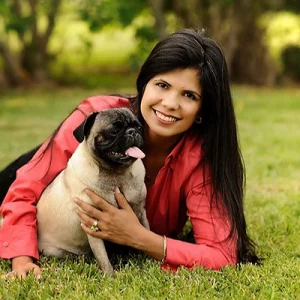EPISODE 164 | RELEASED April 25, 2022
Integrative Medicine: One Veterinarian’s Destiny | Dr. Mitsie Vargas
Dr. Vargas shares her fascinating backstory and how she integrates both traditional cancer treatments and alternative therapies to help her patients.
SHOW NOTES
Finding something that works is the first priority of every dog lover who has a dog with cancer. Dr. Mitsie Vargas knows exactly how you feel, both as a pet owner herself and a veterinarian, parent, and daughter. Her experiences with her own pets and family members – as well as a chance event in vet school – have led her to incorporate natural and alternative therapies alongside the more classical cancer treatments from Western medicine.
Listen to her story and some of the therapies that she has had success treating her canine cancer patients, ranging from Chinese herbs to acupuncture and beyond.
Links Mentioned in the Episode:
[00:00:00] >> Dr. Mitsie Vargas: I never looked back. I said, it’s really not about what’s right or wrong, it’s really what’s best for the patient. And to me, integrative medicine, combining the east and the west, is the best option for patients.
[00:00:19] >> Announcer: Welcome to Dog Cancer Answers, where we help you help your dog with cancer. Here’s your host, James Jacobson.
[00:00:27] >> James Jacobson: Hello friend. Welcome to Dog Cancer Answers. If you are one of those dog lovers who has a dog with cancer and are really looking for all types of therapies that might work, from acupuncture to Chinese herbs, and you kind of get the cold shoulder as you approach your veterinarian, this episode is for you.
We are speaking with Dr. Mitsie Vargas. She is a veterinarian who has been practicing for 30 years. She’s in Florida. And the past dozen or so years, she has been doing integrative treatments for all types of maladies, including cancer. How much does she believe in this type of treatment plan? Enough to recommend it and to basically use it with her father, as you’ll hear in this very interesting conversation. Dr. Vargas, thank you so much for being with us.
[00:01:19] >> Dr. Mitsie Vargas: Hi James, thank you for inviting me. I’m very honored to be on your show today.
[00:01:23] >> James Jacobson: So you are in Florida and you have received a ton of accolades over the years from Best Veterinarian in Florida to Most Loved Veterinarian. I want to find out what that is. That’s a lot of, uh, accolades for one veterinarian.
[00:01:38] >> Dr. Mitsie Vargas: Well, I guess if you’re almost three decades into the business, they’re going to give you at least a participation one, right? No, but I’m really honored about them. Me, I mean I, I hope it comes through that I’m very passionate about what I do and that this to me is not just a profession. It’s my vocation. And I guess that comes through and that’s why I got the accolades, but I just, you know, I love what I do, I’ve been loving it since day one, so.
[00:02:03] >> James Jacobson: So in three decades of practicing veterinary medicine, how has it changed since your days when, when you were just a vet student at Tuskegee?
[00:02:13] >> Dr. Mitsie Vargas: So it’s been big changes, uh, in the profession and the industry as it is. Because when I graduated almost 30 years ago, it was a probably 60-40 male dominated industry. And of course ownership was 95% male ownership. And so nowadays is quite the opposite, swinging towards, uh, 95% of females entering the profession and female ownership is a lot higher as well. So, you know, those are positive things, it’s getting a little bit more inclusive as a profession, more minorities in it, so that’s really good too. And then on the patient’s side, I’ve seen a big dramatic change from considering the pets to be out in the backyard and not quite thinking of them as part of the furniture, but, you know, not in the same regards as we have them today. Nowadays, they’re definitely part of our family.
And with that shifting perception of how we take care of our pets has come a big responsibility for the veterinary profession to offer higher quality, comparable to human medicine, veterinary care. And that people also are more willing to spend money, to look at research, to try options that they were not open, for example, integrative medicine. You probably were not open about that one 30 years ago, but now the, you know, everything is changing towards a more open-mindedness from the consumer and the profession.
[00:03:51] >> James Jacobson: So, as a veterinarian who was trained back in the old system, how did you evolve? You saw the demand, but what was the, what were the things that you did to change how you practice medicine?
[00:04:04] >> Dr. Mitsie Vargas: Well, you know, the big secret is you can’t escape fate. Right? I was trying to just come up with, uh, uh, some topic that all my large animal faculty would not know about and would not ask me and humiliate me in the grand rounds when I was a senior back in 1984 in Tuskegee. Because I mean, I didn’t know much about horses. I was a small animal practitioner, and unfortunately you have to know both and be proficient in both. So I decided to research the most obscure topic and it was using acupuncture to treat laminitis in horses. And it worked, there was crickets in the audience. Nobody asked me anything. I got on A, passed the rounds, and then I put it to the side.
But of course you can’t escape destiny. 15 years into practicing Western medicine, one of my beloved dogs, Hans, he started having problems with his hips. And also Sam, and Sam also had problems with his hips, but Sam was in such pain I decided to use pharmaceuticals on him. And of course, you know, the side effects of certain pharmaceuticals, sometimes, you, you can, you don’t show them, and some animals are more sensitive than others. And my poor Sam got into liver failure. And of course I, I was devastated and I was able to rescue him, but that really opened the door to, you know – I knew about acupuncture, I kind of like had an inkling there was something else. I started with, um, energy healing and I did get proficient about it, and I went to a seminar on reconnection energy and that’s, you know, what I studied. And then after that I did acupuncture and I never looked back. I said, it’s really not about what’s right or wrong, it’s really what’s best for the patient. And to me, integrative medicine combining the east and the west is the best option for patients.
So for my dog, I mean, he lived to be 15, which is unheard of in Shepherds.
[00:06:04] >> James Jacobson: Yeah.
[00:06:04] >> Dr. Mitsie Vargas: And you know, he, he had good quality of life. But I use everything, from nutraceuticals, I started cooking for him, you know, I did a lot of things, acupuncture, a lot of things to help them live to a really long life. And his brother Hans, too, live to be almost 13 in, uh, in good shape.
[00:06:25] >> James Jacobson: When you were doing that with your own dogs, was that sort of outside of what you were at that time practicing with your clients?
[00:06:33] >> Dr. Mitsie Vargas: No, I actually, when I go for it, James, I go a hundred percent. So, you know, I don’t like, you know, dilly dally or, as I said, either I believe in it, or I don’t believe in it. And I use it for myself, for my family, for my pets, and for my patients. My dad had adenocarcinoma of the colon when he was 82.
And, um, you know, I said, well, let’s just do surgery, and then, I got you Dad. And, you know, with, uh, herbals and things like that, and he’s turned 92 this year, 10 years passed and, uh, he did great. He opted for no chemo. He just did all natural. And he’s been, you know, cancer-free for 10 years.
[00:07:15] >> James Jacobson: So the surgery and the Chinese medicine is working for dad.
[00:07:18] >> Dr. Mitsie Vargas: Exactly. So instead of chemo – he did not want it, and when I had the oncologist, you know, conversation, it didn’t go that well because the oncologist was sure there’s three protocols, you just have to pick which one. I said, well, my dad does not want to do chemo and I’m his advocate. So I just, you know, I know, knowing that the tumor was completely out is a different thing, too.
[00:07:43] >> James Jacobson: Right.
[00:07:43] >> Dr. Mitsie Vargas: The tumor was completely out, it was a stage two. And so they have, a little carcinoma. So they, you know, the lymph nodes were clear. Then I said, okay, this is the case, also common sense, obviously, right? So, knowing that, you know, it wasn’t in the lymph nodes, then I decided to strengthen his immune system, and changed his diet and did some lifestyle choices. Like he quit drinking and doing other things that he’s not supposed to do.
[00:08:10] >> James Jacobson: Dad!
[00:08:10] >> Dr. Mitsie Vargas: And, um, and you know, he’s 92, and doing great. And this, those are things that once you ring a bell, you can’t unring it. You know? So once you know the truth, you cannot even pretend you don’t know the truth. So once I see how acupuncture works, I just can’t, you know, oh, I’m going to give you this. So I practice integrative medicine.
[00:08:31] >> James Jacobson: Okay. So I think this is fascinating. Let’s talk about this conversation that you had with your dad’s oncologist, because I think it’s informative of how things work in general and can be applied to dog cancer as well. So you had this conversation with the oncologist and you said, well, I’m a veterinarian, and I believe in acupuncture, and my dad doesn’t want chemotherapy, and I want to treat it this way. And the oncologist said?
[00:09:00] >> Dr. Mitsie Vargas: He turned red and you could almost see the little, you know, smoke coming out of his ears and he said that is placebo. You can’t trust that. You have to take one of these options, you know, that I think is going to be worth. And I said, I’m very happy you know the word placebo, because it works the same as a nocebo. So he thinks the chemo’s gonna kill him. He’s a grown man and I’m not going to be the one to force him to come to the chemo. Because it is gonna – the placebo can act against you or for you.
And placebo is about 30 to 33% of all the healings happen through placebo. And so I just said, don’t placebo me. And then I said to him, you know, I am making an informed decision. I’m here to give a counsel. And in his situation, knowing that the lymph nodes were clear, and, uh, it’s a solitary tumor, and, uh, it had not penetrated all the layers of the colon and there wasn’t any metastasis anywhere, that he was an excellent candidate to, you know, after the surgical and clean margins and everything with the surgeons, they’d done wonderful job. So I had to sign an Against Medical Orders and as I’m signing it, the oncologist said, "You’re signing your dad’s death certificate in six months."
So, yeah, he was very, very low on the bedside manner. A probably very smart guy, but very low on the bedside manner. And I said, okay. I thought many things. I’m very proud of the way my dad raised me so that I could just like say, well, you’re wrong, but I really wanted to just punch him in the throat, but, you know, I didn’t.
And so we just focused on building his immune system. We did a, an herbal that I actually used in, and I’m probably gonna get in trouble for all of this, but anyway, so I did use uh food therapy, Chinese food therapy has the ability to heal by using the energetics of food. So there are foods that actually help break down masses. There’s foods that actually influence the immune system to work better.
They’re anti-inflammatories, they’re, you know, a lot of things that help neurotransmitters work better so that your gut biome, you know, so I put him on probiotics, you know, things like that. So we did a lot of lifestyle choices and some Chinese herbals and he’s done wonderful.
[00:11:36] >> James Jacobson: So 10 years beyond, 10 years out.
[00:11:38] >> Dr. Mitsie Vargas: Yes. And that’s why if I recommend it to my dad, you can believe I am 100% bought into it.
But the reason I recommended it to my dad was because I had already used it in pets and pets have no concept of placebo, you know. They are pure study subjects. They don’t have belief systems. And so that’s really great. You know, I saw things like cancers that were, not totally gone into remission, but at least stopped growing and didn’t cause any problems.
So, I mean, I heard somebody say we all have cancer cells, it’s just the amount of them that we have in the body, and where are they, and what are they doing causing, you know, the other functions. So the main thing, James, that I learned with East and Western approaches is that the Western approach has the mechanistic, you know, that you are a machine. This arm is broken, cut it off, put another one, you know, that’s not broken, cut it off, put a prosthetic. In Chinese medicine, this arm is not working, there must be a reason. You’re an ecosystem. So one system goes down, we must look for the root, what is the disharmony. So I feel that is a more holistic concept.
Look at what you’re eating. Look at your environment. And then look at your genetics, what you came with, and your attitude. So mental attitude, tremendously. And a, a lot of people say, well, dogs are not positive thinkers, but stressors, stress is the number one cause of lowering the immune system. And that will really inhibit the animal’s natural response to cancer or to any other challenge.
[00:13:24] >> James Jacobson: You mentioned the word "nocebo" a moment ago.
[00:13:27] >> Dr. Mitsie Vargas: Yeah.
[00:13:27] >> James Jacobson: A few moments ago. What is nocebo?
[00:13:30] >> Dr. Mitsie Vargas: So, nocebo is the evil twin of placebo. Placebo is the belief that this medication is going to help you and somehow, you inspire, I guess, your, your brain to concoct all these chemicals and all these, uh, neurotransmitters and substances in your body that will provide relief and healing. And they’re called instantaneous healings or placebo healings. And then, the nocebo is the belief that this treatment is going to harm you. And that affects the response, the clinical response. So even if it’s a sugar pill, and they tell you that this is the pill that is going to cause diabetes or cancer or kill you, then the people end up, 30%, about 30%, roughly the same of the placebo responses, but 30% end up having the condition that they feared. And so fear and optimism, they’re two different choices that we have to make as a patient and as a provider of health. So I know the patients that I see, they come with my 100%, I am an optimistic fool. And, uh, you know, also realists, of course, I, you know, tell what we’re, the expectations are, but if it’s all optimism, they will all survive, you know, or at least they live longer or it will be a little bit more improved. So.
[00:15:00] >> James Jacobson: We are going to take a break, because when we come back, I want to get more into the four legged and sometimes three legged patients you, you deal with, and talk a little bit about how you apply some of that in your daily practice. We’ll be right back.
Welcome back to Dog Cancer Answers. We are speaking with veterinarian Dr. Mitsie Vargas. Okay. So Dr. Vargas, we covered how you really believe this, and you would do this with your dad and 10 years later, he seems to be okay for the 92 year old dad. So in your own practice, I’m assuming that the types of clients who come are those that are seeking out and looking for this sort of Eastern approach to blend with whatever they’d been doing. Is that fair?
[00:15:49] >> Dr. Mitsie Vargas: Well, I have uh, different kinds of clients because what I practice is integrative medicine, so even if you come to me with a puppy, we’re gonna talk about food, we’re gonna talk about exercise, I’m going to talk about a lot of stuff that maybe other vets don’t pay too much attention, but I do because I believe the environment and the, especially obesity is one of these predisposing factors to cancer, and their food, the quality of the food is super important to me. So I will talk to them about a lot about theirself, other than the vaccines. Probably do a blood work. Probably, if there’s anemia or anything like that, I’ll probably early on start on like herbs and things that are supplements, nutraceuticals, that will help this puppy. And I will talk about risk predispositions.
So if a King Charles Cavalier Spaniel comes in, I’m going to talk about, this breed is beautiful, I love them, they’re super happy, but they are predisposed to heart disease. So you have to watch for this, this isn’t a – If it’s a Pug, which I have two Pugs myself, they’re predisposed to a lot of things. So, you know, you have to keep them skinny.
So it’s more of a holistic approach and view of it, you’re not just here to talk about the vaccines. And I do vaccinate. I’m not an anti-vaxxer. I am an anti too much of anything. I’m a pro balance. I use uh three-year vaccines. I use titers in animals that have any reactions. You know, so it’s just a common sense approach.
It’s like taking a second and making a customized advice for this patient. Not just because all dogs at this age have to have that. Well, if you come to me for vaccines and your dog is severely underweight or something that I feel is not thriving, vaccines are, you know, in, in the holistic world, vaccines are a heat toxin. I mean that’s what they say in Chinese medicine. They’re a heat toxin. A pro inflammatory.
And, uh, so definitely you’re, it’s a challenge to the immune system. So if a pet puppy comes in and I suspect they have intestinal parasites, or they, I suspect I have something else going on, I would take care of that first. I will postpone the vaccines. They have a place, but it’s not above everything. So it’s just looking at each pet as if they are an individual with different needs and what would be best for that pet, whereas the cookie cutter approach, because dogs are definitely not cookies.
[00:18:21] >> James Jacobson: They’re not. Let’s talk about cancer in general. What are some of the cancers that when you’re presented with them, you go like, Hey, I think this is an awesome application for Chinese herbs and acupuncture?
[00:18:35] >> Dr. Mitsie Vargas: Most solid tumors, when, you know, they’re solid masses, there are many Chinese herbals that are very good about, you know, decreasing the size of the mass. Solid tumors respond really well to that herbal called Stasis Breaker.
[00:18:50] >> James Jacobson: Okay.
[00:18:51] >> Dr. Mitsie Vargas: So I have seen lymphomas live for over a year with just herbals and prednisone and, you know, food.
[00:19:01] >> James Jacobson: Okay. So in terms of acupuncture, ’cause we talked a little bit about some of the Chinese herbs and there’re just so many, but in terms of acupuncture, when do you find that most effective?
[00:19:15] >> Dr. Mitsie Vargas: Oh, acupuncture is, that, it can apply to anything, to any internal disorders. A lot of people know acupuncture for pain, but they don’t know it helps with cancer. And especially even if you’re going to an oncologist, post-chemo, this is a rescuer. I mean, appetite’s shut down, then you just come to my clinic, I usually use uh B12 and inject that in a point on the top of the nose called Shan Gen, and Shan Gen is a point that it improves the appetite of pets, and it’s very, very effective.
And I also have other points to increase the immune system. There’s over 170 points that you can use. And some of them are master points, regional points, or influential points, and infuential points for the immune system are the ones that I use for the cancer patients and, uh, you know, for stamina too, for energy. And, um, I usually tell people to, to not feed kibble with a cancer patient, to start cooking for them.
[00:20:19] >> James Jacobson: Do you have a preferred diet, or just home cooked in general?
[00:20:22] >> Dr. Mitsie Vargas: Yeah. And I’ve cooked for them or used a, you know, use a canned food instead of dried kibble. That’s why I meant. Like dry kibble, you know, since to me it’s a heat, it’s highly pasteurized process and hardened, requires a lot of water to eat it and process it.
And so the cancer is, uh, inflammatory. It’s like adding fire to fire. So when you add canned food or whole foods, you know, to the diet then I see a better improvement. So when I do a recommendation it’s not just the herbs or the acupuncture, but usually we talk about adding some foods.
[00:20:58] >> James Jacobson: Got it. And so you talk a lot about, I mean, the heat and the cool, you know, these are traditional Chinese medicine things. You studied at the Chi Institute, right?
[00:21:08] >> Dr. Mitsie Vargas: Yes. It’s Chi University now, excuse me.
[00:21:11] >> James Jacobson: I’m sorry. When did it become a university? It grew from an Institute to a University. That’s an upgrade.
[00:21:17] >> Dr. Mitsie Vargas: Yeah, this really is a wonderful institution. It’s founded by Huisheng Xie from China. And he’s a doctor, veterinarian and PhD, and he was the head of integrative medicine at the University of Florida for a while. And now, you know, he’s just at the university.
[00:21:35] >> James Jacobson: So you are, you know, located in Florida, you were raised in Puerto Rico, although I understand born in New York.
[00:21:41] >> Dr. Mitsie Vargas: Yeah. I’m a reverse New YoRican. I was born in New York and then I’m raised in Puerto Rico.
[00:21:45] >> James Jacobson: Okay. So you were raised in Puerto Rico, practice in Florida. Are there specific types of clients that seek you out or are you just basically the, you know, like how do you know if it’s a good fit?
[00:21:58] >> Dr. Mitsie Vargas: Well, in the beginning, it was just my regular clients, you know, and I just would do, for example, quality of life appointments.
[00:22:06] >> James Jacobson: Quality of life appointments?
[00:22:08] >> Dr. Mitsie Vargas: Yes.
[00:22:08] >> James Jacobson: What is that?
[00:22:09] >> Dr. Mitsie Vargas: Well, people thinking about is it time, but they’re not sure. So when we do a quality of life appoint, you know, we’ll just talk about what are the symptoms, how far from the normal is your pet.
And so in these quality of life appointments – which were possible euthanasias, right – if, you know, we couldn’t find any, if the owner was sure, but most of these owners weren’t sure.
[00:22:32] >> James Jacobson: You say sure. Sure of what?
[00:22:34] >> Dr. Mitsie Vargas: Sure of that, that euthanasia was the, the only thing left, you know.
[00:22:38] >> James Jacobson: Okay.
[00:22:38] >> Dr. Mitsie Vargas: I said, well, we’ve tried everything except acupuncture, so let’s just try that. And I, I have a paper on this. I can send you the link or-
[00:22:48] >> James Jacobson: Send me the link and we’ll put it in the show notes from today’s episode.
[00:22:51] >> Dr. Mitsie Vargas: Yes. I have a paper on this, it was a, I did an analysis, meta analysis of the patients that I saw for the first two years after I graduated from Chi University. And they were mostly quality of life, you know I just search quality of life appointments. And, um, these appointments, they lived for around 34 months. That was the average. One pet was living at the point that I did the paper. Um, most of them lived for five years after they were sitting with me, saying I think it’s time. And so it’s remarkable that we can extend the lives of many of these patients, some of them were cancer, some of them were just severe multiple organ issues and pain. And so, they were not all cancers, of course, but some of them were cancers. And, uh, I have a case of a hepatocellular carcinoma, when he was 19 months, he came to me and it was the second opinion because they have told her that he had cancer and he wasn’t eating. He had lost 30 pounds.
And I said, okay, well, you can definitely, you know, either when you go with it, but if you’re not sure, let’s give it a chance. And we did acupuncture with him and herbals and food changes. And he lived until he was 11. So of course, you know, when you do that, even if you, if pets, we’re saying that pets are changing to the level of a family member, and you go to certain doctors and they tell you that this is the end, prepare, and you come and you try acupuncture, herbs, and you have ’em for 10 years – I feel if, if I’ve, if you give me two weeks with my pets, two extra weeks, I will be eternally grateful. You give me a year, I’ll be incredulous. If you give me more than a year I’ll be like, I need some of that, I’ll do it for myself, for my family, for everybody else.
And that’s what happened. That’s how I grew, organically. And by, you know, my own clients, where, you know recommending other people, and now I have referrals, so I, you know, after 12 years doing this integrative approach I have people, you know, that are my referrer. I have people that traveled three hours to see me, you know, that’s not uncommon and there’s a lot of other acupuncturists, but they just, nope, I want you. So I’m like ok. I’m here for anybody that wants to come along, um, for you.
[00:25:18] >> James Jacobson: Okay. So we have people who are listening from all over the world who are dealing with dog cancer. And if they’re interested in this type of approach, what do you recommend that they do in terms of finding someone who is, you know, geographically available?
[00:25:35] >> Dr. Mitsie Vargas: So in North America, lists – the Chi University website has a practitioner locator where you go in there and select find a practitioner. Also the International Veterinary Acupuncture Society has the same resource. And the American Academy of Acupuncture, Veterinary Acupuncture, which I’m a board member on and, you know, very involved with.
We also have a, in the website, practitioner locator. So you put your zip code and it tells you where it is, at least in North America. I think the Chi University has it worldwide. So that’s really useful. But I really will recommend to anyone, that, just to at least give it a try. You don’t have to leave your oncologist, I don’t recommend any of that. I say, what else can we do? Every time he goes through chemo, you know, suffers for two weeks or the white blood cells go to the floor. Well, maybe we can do an herbal, maybe we can do specific acupuncture treatment to see that, that that immune system can withstand the, the useful, I mean, they are useful chemotherapies, chemicals, but then let’s say that the, if you have a mass, like mast cell tumor, I will always say a mast cell, if you can take it out, take it out. You’re not gonna hear me argue about that. There’s a place for Western medicine and for Eastern medicine.
[00:27:01] >> James Jacobson: Is there ever a time that you would advocate for chemotherapy?
[00:27:05] >> Dr. Mitsie Vargas: Yeah. If it’s a young patient and um, if the chemotherapy has a fair success rate.
[00:27:13] >> James Jacobson: Which type of, like a CHOP protocol for lymphoma or, what would you do?
[00:27:17] >> Dr. Mitsie Vargas: Yeah. Exactly like that, like it, that’s more like standard medicine, you know, that you have to go for it because it has a good survival time for at least a year. So we had some CHOP protocols that lived two years, you know, with the, doing it and then, you know, acupuncture.
So it was the integrative approach.
[00:27:37] >> James Jacobson: Do you work hand in hand with any local veterinary oncologists?
[00:27:40] >> Dr. Mitsie Vargas: I work with anybody.
[00:27:43] >> James Jacobson: Are there some that you work with a lot?
[00:27:45] >> Dr. Mitsie Vargas: Dr. Kane. No, uh, there was a couple of doctors that, you know, they understand what it is and nowadays again, I have to say James, when I started 12 years ago, way different. Way different.
It was woo woo magic, witchy, witchy, Chinese herbs have heavy metals, and whatnot. I use formulas that are made here in the United States and they are checked for all of that. They’re very high quality, number one. Number two, they don’t have any animal or – I’m vegan. So I couldn’t use anything, you know, that would be, you know, taking pangolin or anything like that, scales or anything like that or, or tigers, I would break my heart to use anything like that. I would never use anything like that. We’re talking about ones that have evidence-based studies behind them, not just folklore, just evidence-based. And so I do work with some, and in the beginning, not many will refer, some will have animosity. But now even on the referral practices like BluePearl, they have an integrated branch. They do rehabilitation now. They add acupuncture. I’m very excited because things are changing.
[00:28:59] >> James Jacobson: Things are changing and you are part of the change, been doing it for 30 years. Thank you so much, Mitsie Vargas. I appreciate you being with us today.
[00:29:08] >> Dr. Mitsie Vargas: Thank you for having me.
[00:29:10] >> James Jacobson: And I want to thank you for joining us today and hitting that play button. Here on Dog Cancer Answers, we talk to all types of veterinarians around the world who are treating dog cancer, from the latest cutting edge radiation therapy to alternative therapies, as they’re described, Chinese medicine, and some of these are obviously thousands of years old. We want to give you as many opportunities to understand the full spectrum of things that are available so that you can customize the right treatment plan for your dog.
I’m James Jacobson. From all of us here at Dog Podcast Network, I want to wish you and your dog a very warm, Aloha.
[00:29:56] >> Announcer: Thank you for listening to Dog Cancer Answers. If you’d like to connect, please visit our website at DogCancerAnswers.com or call our Listener Line at (808) 868-3200. And here’s a friendly reminder that you probably already know: this podcast is provided for informational and educational purposes only.
It’s not meant to take the place of the advice you receive from your dog’s veterinarian. Only veterinarians who examine your dog can give you veterinary advice or diagnose your dog’s medical condition. Your reliance on the information you hear on this podcast is solely at your own risk. If your dog has a specific health problem, contact your veterinarian.
Also, please keep in mind that veterinary information can change rapidly, therefore, some information may be out of date. Dog Cancer Answers is a presentation of Maui Media in association with Dog Podcast Network.
Hosted By
SUBSCRIBE ON YOUR FAVORITE PLATFORM
Topics
Editor's Picks
CATEGORY








